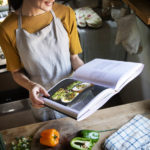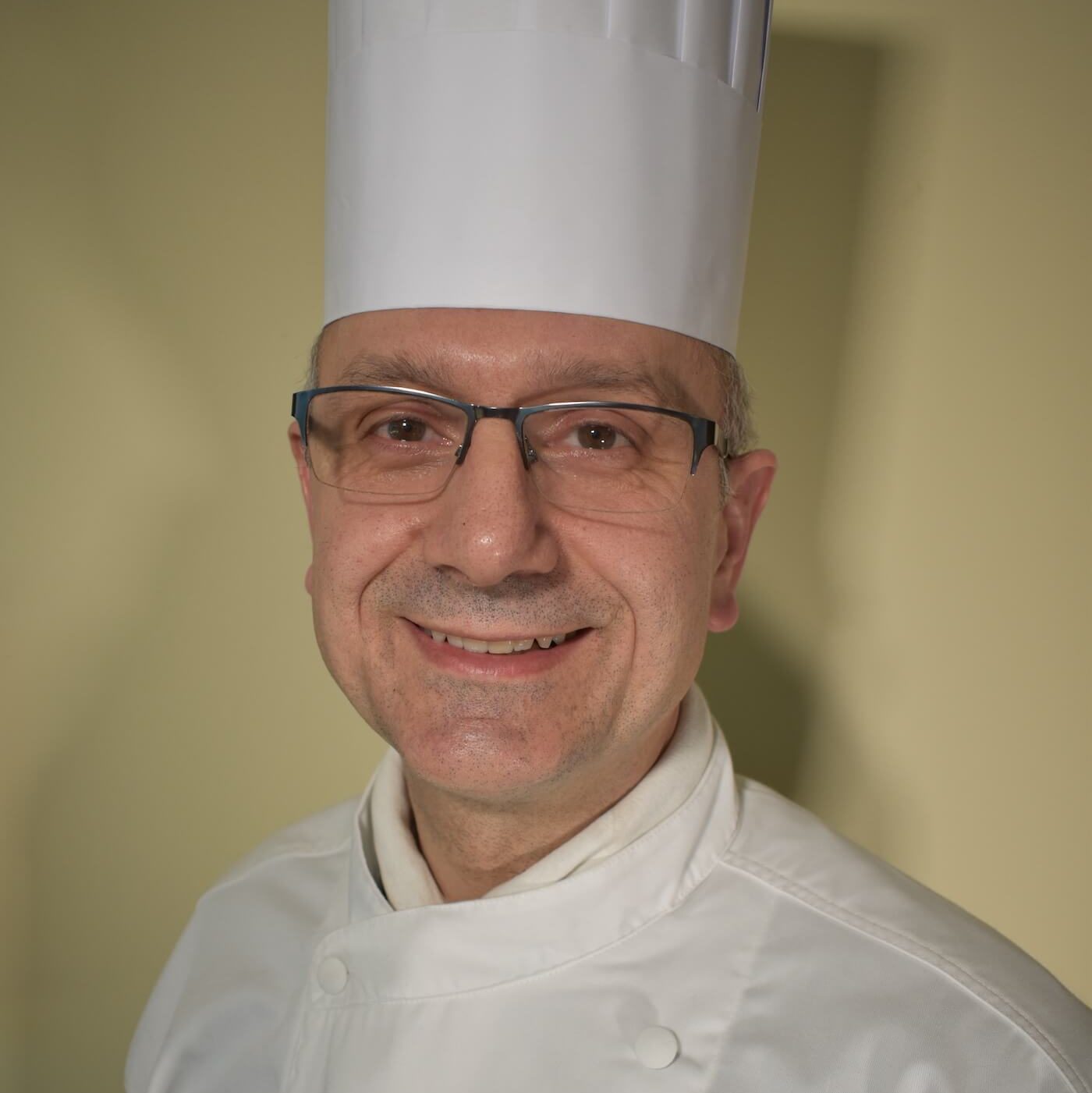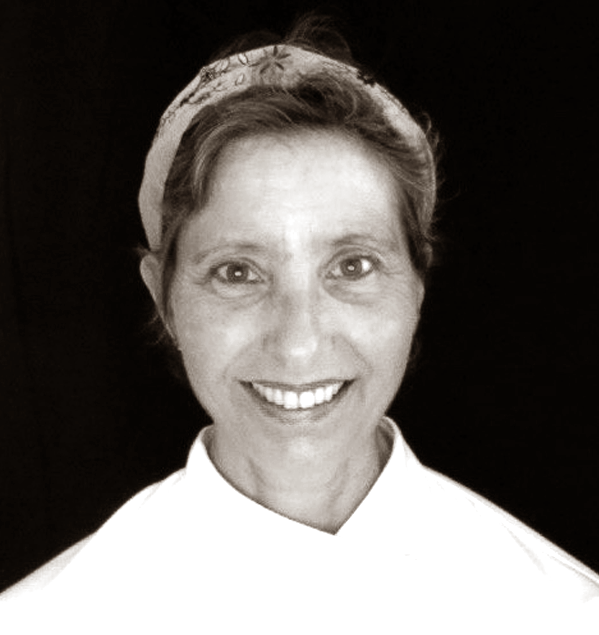A published cookbook is an impressive achievement for a chef. It’s a chance to share your recipes with the world, while also building your personal brand.
Before you dive into the process, know that there’s a lot more to a cookbook than the actual writing! As a cookbook author, you’ll have to make important decisions about not just the recipes, but the book concept, design, and promotion.
Writing a cookbook is a labor of love, but in the end, you’ll be a published author with a work you can be proud of.
Here’s what it takes to write a cookbook from start to finish.
Create Your Cookbook Concept
Before writing a word, you’ll need to come up with a concept. Most cookbooks focus on a specific niche which makes them attractive to a certain subsection of people.
This could be a single type of dish that you’re expert in, like Auguste Escoffier School of Culinary Arts Chef Instructor Colette Christian’s book Mastering Macarons: Classic to Contemporary Techniques. Or it could be a guide to better health, like Escoffier Chef Instructor Marc Bauer’s Dropping Acid: The Reflux Diet Cookbook and Cure.
“[Dropping Acid] is a groundbreaking approach to healthy eating featuring recipes to lower and stop acid reflux symptoms.”
Marc Bauer, Escoffier Chef Instructor and Co-Author, Dropping Acid: The Reflux Diet Cookbook and Cure
Choosing your concept will help you curate your recipes around a central theme, so the cookbook is cohesive.
Decide: Self-Publish or Seek a Traditional Publishing Deal?
Yes, before you write your cookbook, you need to decide how you plan to sell it.
Why?
Because if you plan to seek a publishing deal, you’ll need an agent. And to find one of those, you’ll need a book proposal before you write your book. Here’s what to know about traditional publishing vs. self-publishing.
Why You May Choose to Seek a Publishing Deal
Publishers Will Pay You An Advance
When you sign with a publisher, they will pay you an advance in installments. You will then use these funds to cover some of the costs of book creation, like testing recipes, taking photos, and possibly even a book tour. Without a publisher, you will have to cover these costs yourself.
The publisher will recoup this advance from your royalties. If you get a $100,000 advance, you will not get any royalty money until that advance is repaid through your book sales. If you don’t sell enough books to repay the advance, you don’t have to pay it out of pocket—but you won’t receive any royalties past the initial advance.
Publishers Have Large Print and Distribution Networks
The publisher can get your book into more stores and retailers than you could on your own. They also work at a large scale, so they can get your book printed at a lower cost.
Publishers Have PR and Marketing Teams
These pros can help get the word out about your cookbook. But keep in mind that they may be promoting a number of books at once, so they can be stretched thin.
Publishers Know the Market
A publisher can tell you if there is a market for your book idea before you spend months or even years writing it.
Once you decide on your concept, you will write a cookbook proposal outlining what you plan the book to be about and include some sample content. If you have a large social media following or a well-known restaurant, this is key information to include as well. It will show that there may be a built-in market for your book.
You’ll then send this proposal to literary agents to find representation. And when an agent agrees to work with you, they’ll use your proposal to shop your idea to publishers. That’s why the concept comes first!

Why You May Choose to Self-Publish
While publishing companies offer several benefits, they come at a cost.
As mentioned above, authors are paid a portion of the publisher’s revenue, called a royalty. Royalties are usually 20-30% of the book’s revenue. The publisher isn’t just pocketing the balance—they have to pay for printing costs, promotions, and other expenses. But they do keep a profit as well.
If you self-publish, you’ll also have to pay for the printing costs, but you will keep all the profits instead of sharing them with the publishing company. You can also self-publish your book digitally for use on e-readers and tablets, which can dramatically reduce the costs of publishing. Escoffier Chef Instructor Katie Rosenhouse went the self-publish route with her cookbook, Pantry Baking: A Guide to Baking with What You’ve Got.
On the downside, you’ll have to do all of your own promotion. And if you do print physical copies, you won’t be able to get your book in as many stores as a publisher could.
Start Testing and Collecting Recipes
Unlike a food blog, a printed cookbook can’t be fixed later if you accidentally write tablespoon instead of teaspoon. The recipes must be perfect!
Start with recipes that you’ve already practiced and polished. For example, Escoffier Pastry Chef Instructor Colette Christian wrote her macaron cookbook after she perfected the macaron recipe for her culinary school.
“The macaron recipe didn’t work, so my boss was like, ‘Fix it!’ I was definitely the fixer. And I turned that into a book!”
Escoffier Pastry Chef Instructor and Master Baker Colette Christian
Once you “finalize” each recipe, hand them over to a recipe tester to make sure they can follow the steps.
If this is the only part of the project that excites you, a collaboration project as a recipe developer may be more appealing than writing a whole cookbook. That’s what Escoffier Chef Instructor Paul Rocque did when he provided recipes to Sur La Table for their dessert cookbook, So Sweet! Cookies, Cupcakes, Whoopie Pies, and More.

Create Your Outline
Writing without a plan is a sure way to confuse your readers, rather than provide clarity.
As you collect your recipes, start organizing them into sections that make sense. These could be obvious categories like cakes, cookies, and pies for a baking cookbook. Or they could be more unique, like an Italian cookbook that organizes recipes by region.
When you have your recipes in the appropriate sections, you’ll have a rough outline of the way your book will flow.
Start Writing!
It’s finally time to write your cookbook!
Beyond the recipes themselves, most cookbooks have additional written content like introductions, personal stories, recipe history, or the science behind certain techniques.
If you’re concerned about your writing skills, you can bring on a co-writer to help your words shine. (Another use for that advance money!) Don’t forget to explain concepts the reader may need help with. Not everyone knows what it means to “fold in the egg whites,” so an introduction or sidebar that explains cooking terms can be a big help!

Hire a Photographer and Food Stylist
More than nearly any other type of book, cookbooks rely on high-quality photos to show steps, techniques, and finished products.
You’ll need a food photographer and possibly a food stylist to make your dishes look their best. If you have a publisher, they may choose these pros from people they’ve worked with before.

Lay Out the Book
How exactly will each page look? What fonts will you use, and where will the pictures go?
If you have a publisher, they will probably handle the layout. But if you self-publish, you may need to hire someone with design experience to make sure your layout is appropriate for printing.
Edit and Polish
If you have a publisher, they’ll provide an editor to pore over the book for spelling and grammar mistakes, inconsistency, and opportunities for improvement.
If you’re self-publishing, a professional cookbook editor can be the difference between a decent cookbook and a great one.
Print and Promote!
The purpose of writing a cookbook is to get it read! Whether you publish through a publisher, or create a digital version to sell online, share the good news with everyone you can.
Friends and family, coworkers, restaurant guests, social media followers, fellow culinary school graduates—share your new cookbook with everyone you can think of to boost sales and get your book into readers’ hands.

Leave a Legacy
Writing a cookbook is a lot of work. But in an industry where what we create is only here for one meal, it’s rewarding to make something that lasts. Plus, a published cookbook can be a great marketing tool for a restaurant or other food business.
A culinary school education can help you build the skills you’ll need to write your own cookbook. The best time to start is now!
Learn more about cooking and culinary arts with these resources:

 “[Dropping Acid] is a groundbreaking approach to healthy eating featuring recipes to lower and stop acid reflux symptoms.”
“[Dropping Acid] is a groundbreaking approach to healthy eating featuring recipes to lower and stop acid reflux symptoms.” “The macaron recipe didn’t work, so my boss was like, ‘Fix it!’ I was definitely the fixer. And I turned that into a book!”
“The macaron recipe didn’t work, so my boss was like, ‘Fix it!’ I was definitely the fixer. And I turned that into a book!”
